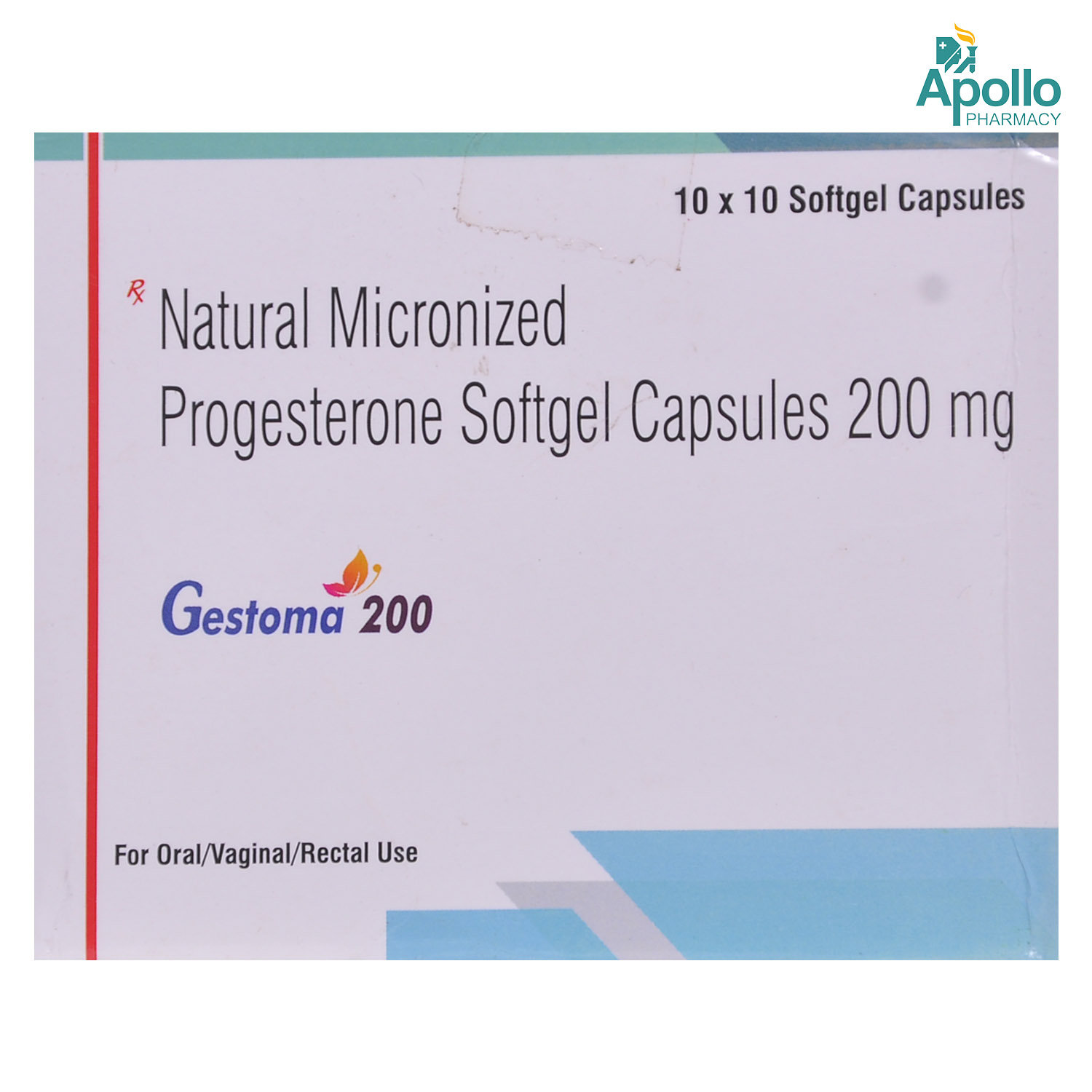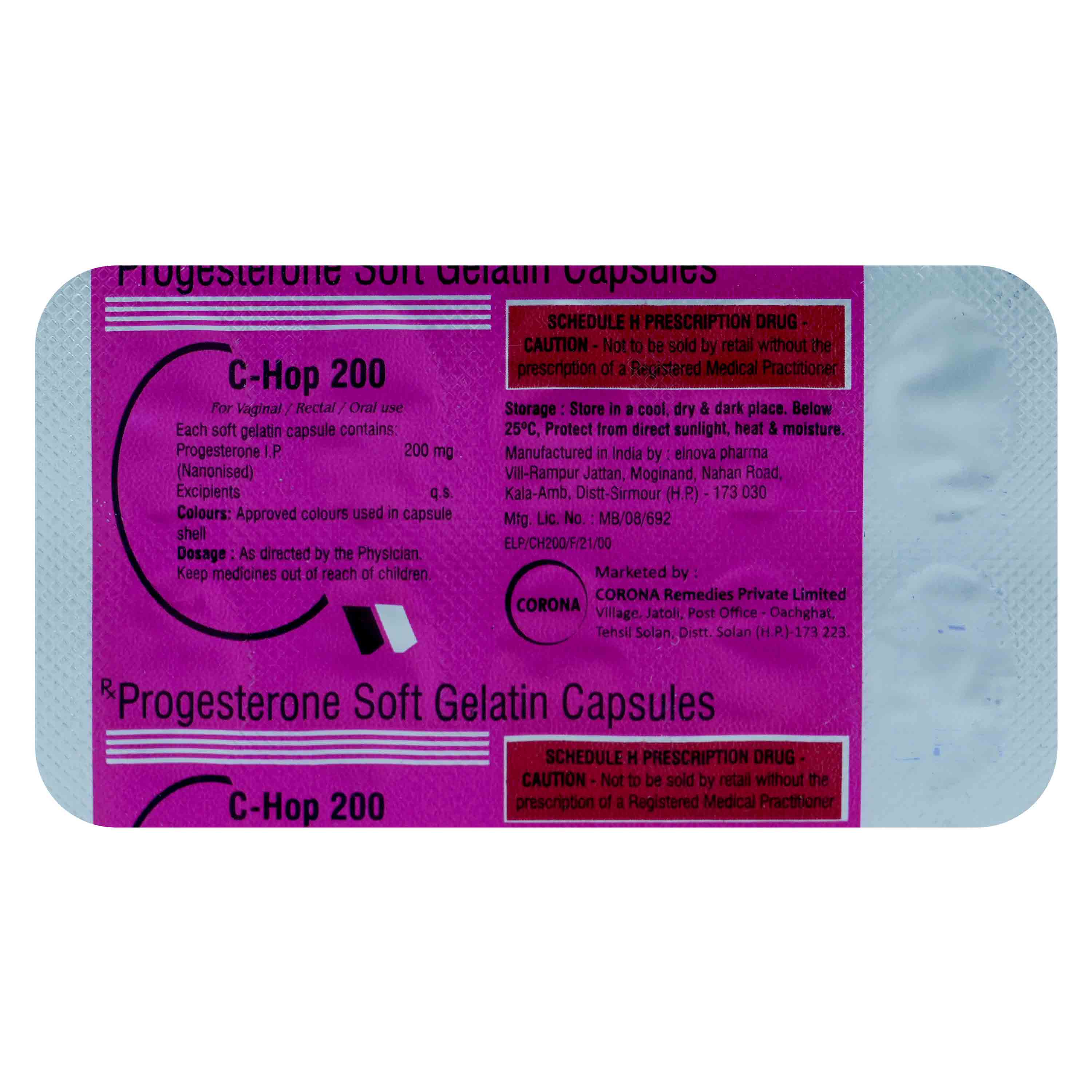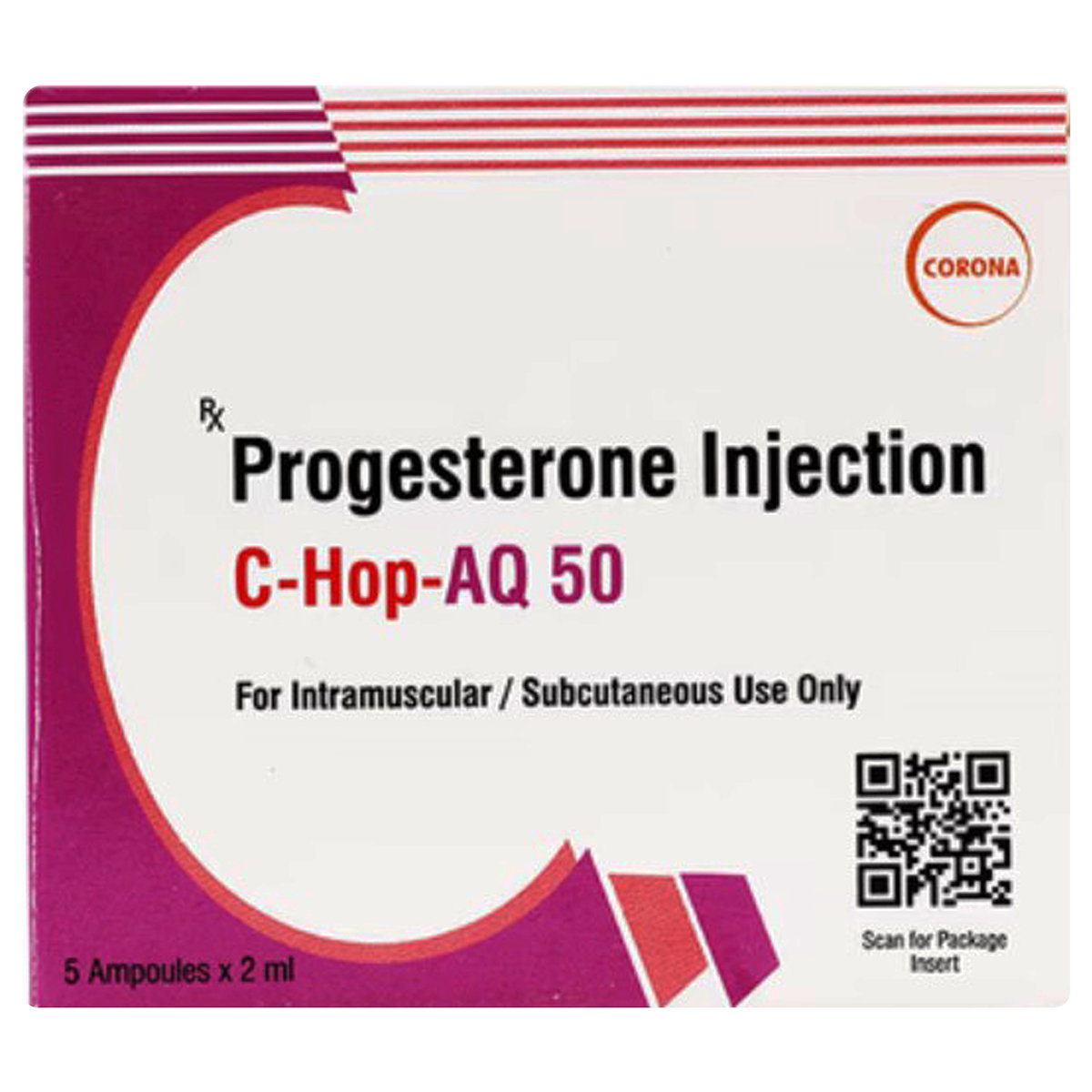Progesterone
About Progesterone
Progesterone is used as hormone replacement therapy, and in the treatment of amenorrhoea (absence of menstrual periods), prevents endometrial hyperplasia (thickened uterus lining). Hormone replacement therapy is a treatment to relieve menopause symptoms. It replaces hormones that are at a lower level as you approach menopause.
Progesterone contains progesterone, which works by replacing oestrogen and progesterone hormone levels in the body and providing relief from menopause symptoms.
In some cases, you may experience side effects such as dizziness, drowsiness, headache, mood changes, diarrhoea, vaginal discharge, joint pain, or constipation. Most of these side effects do not require medical attention and resolve on their own. However, if they persist, please consult your doctor.
Administer Progesterone orally, with or without food. You are advised to take Progesterone for as long as your doctor has prescribed it for you based on your medical condition. For better results, take Progesterone around the same time daily.
If you are allergic to soy, Progesterone, or any other medicines, please tell your doctor. Avoid taking Progesterone if you have breast cancer, unexplained vaginal bleeding, blood clots or blood clotting disorder, liver disease, porphyria (a disorder in the formation of red blood pigment) or cerebral haemorrhage (bleeding in the brain). Avoid taking Progesterone if you are pregnant, as it may harm the unborn baby. Drive only if you are alert, as Progesterone may cause drowsiness or dizziness.
Uses of Progesterone
• Hormonal Replacement Therapy: Progesterone is commonly used in women undergoing hormonal replacement therapy to manage symptoms associated with menopause or hormonal imbalances.
• Luteal Phase Support: Progesterone is prescribed to support the luteal phase during assisted reproductive technologies like in vitro fertilization (IVF), increasing the chances of pregnancy.
• Menstrual Disorders: Progesterone helps regulate the menstrual cycle and manage symptoms related to irregular menstruation.
• Endometrial Preparation: Progesterone aids in preparing the endometrium for implantation during fertility treatments, ensuring an optimal environment for a fertilized egg.
• Prevention of Miscarriage: In some cases, Progesterone is recommended for pregnant women with a history of recurrent miscarriages to help maintain the pregnancy and provide support during its early stages.
Medicinal Benefits
- Progesterone contains progesterone that is used in combination with oestrogen for hormone replacement therapy.
- Progesterone replaces estrogen and progesterone hormone levels in the body and helps in providing relief from menopause symptoms.
- Progesterone is also indicated for the maintenance of pregnancy, threatened abortion and prevention of preterm labour.
Directions for Use
- Progesterone can be taken with or without food as advised by your doctor.
- Follow your doctor's instructions on the dosage and timing of this medication.
- Swallow Progesterone as a whole with a glass of water.
- Do not crush, break, or chew it.
Storage
Side Effects of Progesterone
- Dizziness
- Drowsiness
- Headache
- Mood changes
- Diarrhoea
- Vaginal discharge
- Joint pain
- Hot flashes (sudden feeling of warmth)
- Constipation
Drug Warnings
- If you are allergic to soy, Progesterone, or any other medicines, please tell your doctor.
- Avoid taking Progesterone if you have breast cancer, unexplained vaginal bleeding, blood clots or blood clotting disorder, liver disease, porphyria (a disorder in the formation of red blood pigment) or cerebral haemorrhage (bleeding in the brain).
- Avoid taking Progesterone if you are pregnant, as it may harm the unborn baby.
- You are advised to use effective birth control methods while taking Progesterone to prevent pregnancy.
- If you are pregnant, planning for pregnancy or breastfeeding, please consult a doctor before taking Progesterone.
- It is advised to drive only if you are alert, as Progesterone may cause drowsiness or dizziness.
- If you have diabetes, high blood pressure, migraine or severe headaches, gallstones, asthma, fits, systemic lupus erythematosus (an autoimmune disease) or if you ever had depression, inform your doctor before taking Progesterone.
- Also, if you are about to undergo any surgery, please inform your doctor that you are taking Progesterone.
Drug Interactions
Drug-Drug Interaction: Progesterone may interact with anticonvulsants (carbamazepine, phenytoin, phenobarbital), anti-tuberculosis drugs (rifabutin, rifampicin), anti-HIV drugs (ritonavir, nevirapine, nelfinavir, efavirenz), benzodiazepine (diazepam), water tablet (spironolactone), immunosuppressant (ciclosporin), blood thinners (phenindione), skeletal muscle relaxants (tizanidine), antifungals (terbinafine, ketoconazole, griseofulvin).
Drug-Food Interaction: Progesterone may interact with St. Jonh’s wort (herbal supplement to treat depression).
Drug-Disease Interaction: Avoid taking Progesterone if you have breast cancer, unexplained vaginal bleeding, blood clots or blood clotting disorder, liver disease, porphyria (a disorder in the formation of red blood pigment), or cerebral hemorrhage (bleeding in the brain). If you have diabetes, high blood pressure, migraine or severe headaches, gallstones, asthma, fits, systemic lupus erythematosus (an autoimmune disease), or if you ever had depression, inform your doctor before taking Progesterone.
Drug-Drug Interactions Checker List:
Safety Advice

Alcohol
consult your doctorInteraction of Progesterone with alcohol is unknown. Please consult a doctor before consuming alcohol while using Progesterone.

Pregnancy
consult your doctorProgesterone supports pregnancy and helps in the maintenance of pregnancy. However, please consult a doctor if you are pregnant before taking Progesterone.

Breast Feeding
consult your doctorProgesterone may be excreted in human milk. Therefore, please consult a doctor if you are breastfeeding.

Driving
unsafeProgesterone may cause dizziness or drowsiness. Therefore, avoid driving if you feel dizzy or drowsy after taking Progesterone.

Liver
consult your doctorPlease consult a doctor if you have a history of liver disease. The dose may be adjusted by your doctor as required.

Kidney
cautionProgesterone should be given with caution, especially if you have a history of kidney disease. The dose may be adjusted by your doctor as required.

Children
unsafeProgesterone is not recommended for children.
Habit Forming
Diet & Lifestyle Advise
- Do regular exercise and physical activity to minimize hot flushes and improve sleep. Aerobics, yoga, and activities like tai chi may help in relaxing the body and mind.
- Try to wear loose clothes before going to bed and sleep in a cool, well-ventilated room. Doing this can prevent symptoms of hot flushes and night sweats. Take minimum sleep of 8 hours.
- Avoid or limit intake of caffeine-containing beverages, alcohol, and spicy food, as these are known triggering agents for hot flushes.
- Try to be stress-free to improve your mood swings due to hormonal fluctuations.
- Quit smoking as it will help to reduce hot flushes and your risk of developing chronic conditions like heart disease, stroke, and cancer.
Special Advise
If you need to undergo any blood test, please inform the lab technician that you are taking hormone replacement therapy (HRT) as it may affect some test results.
Patients Concern
Disease/Condition Glossary
Hormone replacement therapy (HRT): It is a treatment to relieve menopause symptoms. It replaces hormones that are at a lower level as you approach menopause.
Amenorrhoea: It is the absence of menstrual periods in a woman of childbearing potential due to a lack of progesterone.
Endometrial hyperplasia: It is a condition where the uterus lining (endometrium) becomes unusually thick due to excessive cells (hyperplasia).
FAQs
Progesterone is used in combination with oestrogen for hormone replacement therapy. Besides this, Progesterone also treats amenorrhoea (absence of menstrual periods) and prevents endometrial hyperplasia (thickened uterus lining). Also, it is indicated for the maintenance of pregnancy, threatened abortion and prevention of preterm labour.
Progesterone contains Progesterone that works by replacing oestrogen and progesterone hormone levels in the body and helps in providing relief from menopause symptoms.
Progesterone may increase the risk of blood clots especially in patients with a history of blood clots. However, if you experience sudden chest pain, difficulty in breathing or painful swelling and redness of legs, stop taking Progesterone and consult a doctor immediately as these might be signs of blood clot.
If oestrogen is used alone for hormone replacement therapy, it may increase the risk of endometrial hyperplasia (excessive thickening of uterus lining) and endometrial cancer (cancer of the womb). Oestrogen in combination with Progesterone reduces this risk.
You are recommended to inform your doctor that you are taking Progesterone as you may need to stop taking Progesterone 4 to 6 weeks before surgery to decrease the risk of blood clot.
Progesterone may increase the risk of uterine cancer. However, if you experience any unusual vaginal bleeding, please consult a doctor immediately.
Progesterone is not a contraceptive. You are recommended to use additional contraceptive methods to prevent pregnancy while taking Progesterone.
Progesterone should be swallowed as a whole with water. Do not crush or chew it.
Progesterone is a hormone extracted from plants and is chemically identical to human progesterone.
Yes, Progesterone can be taken daily. Usually, it is taken once everyday in the evening or at bedtime.
Some people might gain weight due to other reasons while taking Progesterone. Consult the doctor if you notice weight gain during Progesterone therapy.
Yes, Progesterone is safe if taken in the dose and duration prescribed by the doctor.
Progesterone plays a vital role in fertility. It improves the chances of becoming and staying pregnant by preparing the uterus lining.
Progesterone may cause side effects like dizziness, drowsiness, headache, mood changes, diarrhoea, vaginal discharge, joint pain, hot flashes (sudden feeling of warmth) or constipation. If the side effects persist or worsen, please consult your doctor.







